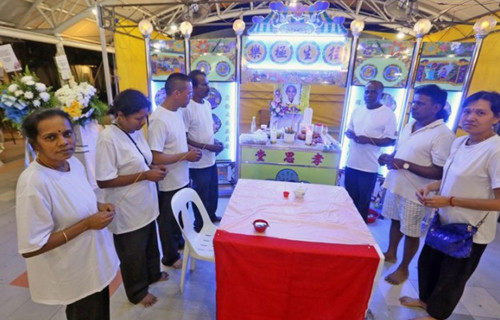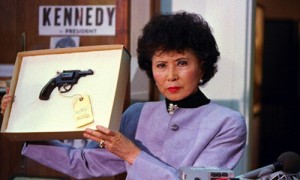3月5日,83岁的Koh Leng Kiat先生去世,他的印度继子和他的亲生孩子以传统的道教方式给他举办了葬礼.

Their love story is uniquely Singaporean, and its beauty lies in the sacrifice, kindness and devotion it exemplifies.
他们的爱情故事在新加坡可以说的上是独一无二,故事的美丽在于过程中间所体现的牺牲、善良和奉献精神。
When Mr Koh Leng Kiat died at the age of 83 on March 5, his Indian stepchildren and his biological children conducted his funeral the traditional Taoist way even though they had little knowledge of how to do it.
3月5日,83岁的Koh Leng Kiat先生去世,他的印度继子和他的亲生孩子以传统的道教方式给他举办了葬礼,尽管他们对如何安排葬礼过程一无所知。
Theirs is a family unlike the norm, a family brought about by an incident that happened in 1966.
和一般家庭不同,这个家庭的建立起源于1966年发生的一起事故。
That was the year a car accident killed 24-year-old Meena Jaganathan’s husband, leaving her with eight children, the youngest of whom was just two months old.
那年车祸Meena Jaganathan的24岁的丈夫去世,留下了8个孩子,其中最小的孩子只有两个月大。
To make ends meet, she joined a construction company as a manual labourer in 1967.
为了维持生活,她于1967年加入建筑公司做苦力劳动。
After just a few months on the job, she had appendicitis. Mr Koh, 32, who was her supervisor, took her to hospital where she was warded.
在工作几个月后,她患上了阑尾炎。那时32岁的Koh先生是她的主管,于是他带她去医院治疗。
Desperate because there was no one to look after her children, she turned to Mr Koh. To her relief, he agreed to help and headed to her kampung home in Joo Chiat.
迫于没有人照顾她的孩子,她向Koh先生需求帮助。出于同情的原因,他同意暂时去她住在如切的贫瘠的家帮忙照看孩子们。
What he saw upset him, five boys and three girls with an uncertain future, living in a small house without a father.
到了她的家之后,现场的场景令他很难受,看似没有未来的五个男孩和三个女孩竟然生活在一个没有父亲的家庭里。
Shaken by their predicament, he was determined to do something.
看到他们生活的如此窘迫,他决定帮助他们。。
After Madam Meena returned, he started to help out bit by bit, providing financial assistance and buying goods for the family of nine.
Meena女士回来之后,他开始点滴的帮助她们,为九口之家提供财务援助和一些生活用品。
To repay his kindness, Madam Meena would often cook and serve him food during his visits to her home.
为了报答他的好意,Meena女士经常在他来家之后给他做饭或拿出一些点心给他吃。
Slowly but surely, love grew despite language and cultural barriers.
尽管存在语言和文化障碍,但爱情是无界限的,情蒂慢慢的蔓延至两人的心内。
Mr Koh’s acts of compassion melted Madam Meena’s heart, while her care and concern attracted him.
Koh Leng Kiat的慈悲行为融化了米Meena女士的心,而她的关切和问候也深深吸引了他。
Appa (father) loved amma’s (mother) cooking a lot. He loved dalcha, mutton curry, chicken curry and fish curry. He often joked that he fell for those dishes, said the couple’s first child, Mrs Chitra, 46.
“父亲非常喜欢妈妈做饭,他喜欢达尔茶、咖喱羊肉、咖喱鸡和咖喱鱼,他经常开玩笑说他沉醉于这些饭菜。”这对夫妇的第一个孩子,46岁奇特拉太太说。
Despite his parents refusal to give their blessing, Mr Koh married Madam Meena in 1970, and the couple lived in her Joo Chiat home.
尽管Koh Leng Kiat的父母不同意他们的婚事,但他仍于1970年与Meena女士结婚,这对夫妇住在她如切的家中。
They had four children of their own - two boys and two girls.
他们有四个自己的孩子 - 两个男孩和两个女孩。
It was only after Mrs Chitra’s birth that Mr Koh’s family started to accept his wife and stepchildren.
直至奇特拉太太出生后,Koh Leng Kiat的家人才开始接受他的妻子和继子女。
The stepchildren and the biological children grew up in a tightly knit family that used a variety of languages to communicate.
这些继子女和他们的亲生孩子在这个亲密的家庭中长大,他们使用各种语言进行交流。
Appa was a good man. He neither smoked nor drank alcohol. He always came home directly after work. He always spent time with us, recalled one of their children.
“他是个好人,他既不吸烟也不喝酒,他总是在下班后就直接回家,闲暇时光他总是跟我们在一起,”其中一个孩子回忆说。
He said that in the late 1980s, the family moved into a three-room Housing Board flat in Bedok.
他说,在20世纪80年代后期,这个家庭搬到了Bedok的一个三居室的房子居住。
Sadly, Madam Meena died in 1994 at the age of 52. Mr Koh was heartbroken and found it difficult to accept that she was gone.
可悲的是,Meena女士1994年去世,享年52岁。许先生伤心欲绝,很难接受她离开的现实。
Mr Koh treated all the children the same way, making no distinction between his stepchildren and his biological children.
他仍以同样的方式对待所有的孩子,在对待继子女和亲生孩子方面仍然保持如一。
When the elderly man was hospitalised, though there was a limit of four visitors at any one time, his family members divided themselves into small groups and took turns to visit him within the same day.
当老人住院时,虽然每次有四位访客的上限,但他的家人分成小组,轮流在同一天内来照顾他。
On seeing all of us, appa would gain new strength, said Mrs Chitra with a smile.
“在看到我们所有人的时候,爸爸将获得新的力量,”奇特拉太太微笑着说。
Initially, the children fondly called Mr Koh "uncle".
最初,孩子们喜欢叫他“叔叔”。
But in the final stage of his life, his stepchildren started calling him "appa", which moved Mr Koh tremendously.
但是在他生命的最后阶段,他的继子女开始称他为“父亲”,这让他感到非常高兴。
It was only two months ago when my dad told me to conduct his funeral in a Chinese way. He knew that his time was nearing, said Mr Nalandran. "I was his favourite son. He shared everything with me."
“只有两个月前,当我父亲告诉我以中国人的方式举行他的葬礼时,他知道他的时间已经差不多了,”纳兰德兰先生说。“我是他最喜欢的儿子,他与我分享了一切。”
After Mr Koh died early this month, his stepchildren and biological children conducted the funeral according to his wishes.
在他本月初去世后,他的继子女和亲生孩子根据自己的意愿进行了葬礼。
The children were dressed in traditional funeral clothes, there was a band and everything was done according to Taoist tradition.
孩子们穿着传统的葬礼服,并伴有乐队,一切都按照道教传统完成。
During the three-day wake, the family cooked non-vegetarian dishes and served them to those who attended.
在为期三天的活动中,家庭烹制了非素食菜肴,并送给参加者。
They folded and burnt gold, silver and bronze notes. They also lit incense sticks.
他们折了元宝纸钱,还点燃了香烛。
He was our loving father. We did what we could to make sure his soul rests in peace, said Mr Nalandran.
“他是我们慈爱的父亲,我们尽我们所能确保他的灵魂平静下来,”纳兰德兰先生说。
I wish he will be my father in my next birth. He was a very, very good man. I never cried so much, not even when my mother passed away. I simply could not bear his loss.
“我希望来世他仍是我的父亲他,他是一个非常非常好的人,即使在我母亲去世的时候我也没有哭过,但是我他的离世却让我忍不住大声哭泣。







